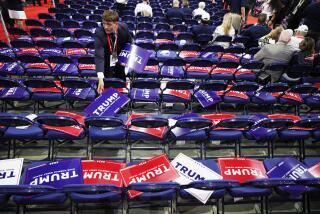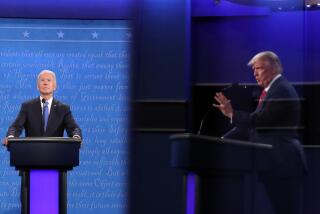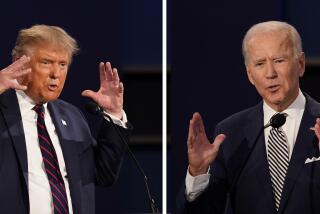President Adjusts the Focus
- Share via
WASHINGTON — In an election year that is looking increasingly dire for Republicans, Wednesday brought the White House at least one triumph: President Bush was able to set aside talk about former Rep. Mark Foley, the congressional page program and the ethics inquiry into what leaders knew and when they knew it.
For almost an hour Wednesday, Bush focused public attention on national security, the economy and the tax policies of the Democratic Party -- all issues that GOP strategists would prefer to discuss as the clock ticks on their ability to salvage the midterm elections.
Bush’s latest Rose Garden news conference was designed in part to give the president a platform to reassert control of the public debate and divert attention from Foley, the former GOP lawmaker whose sexual interest in teenage congressional pages has dominated news coverage.
Even when the subject came up during the news conference, Bush pushed the conversation back into the GOP comfort zone, all but begging voters to look beyond the scandal when they head to the polls Nov. 7.
“This Foley issue bothers a lot of people, including me,” Bush said. “But I think when they get in that booth, they’re going to be thinking about how best to secure the country from attack, and how best to keep the economy growing.”
Several recent polls have shown Republicans at increasing risk of losing the House and possibly the Senate, and Bush’s appearance underscored the challenges faced by his party at a time when neither domestic nor foreign affairs seemed to be helping its electoral cause.
That difficulty was evident Wednesday. Bush appeared pleased to defend his policies toward North Korea and Iraq, but was compelled to respond to Democratic charges that he had allowed Pyongyang to build a nuclear bomb while ousting Saddam Hussein out of fear that the Iraqi leader might develop one.
“Obviously, I’m listening very carefully to this debate,” the president said. “I can remember the time when it was said that the Bush administration goes it alone too often in the world, which I always thought was a bogus claim to begin with. And now all of a sudden people are saying the Bush administration ought to be going alone with North Korea.”
Bush’s comments on North Korea were his most detailed on the subject since that country’s apparent nuclear testing this week sparked a new round of partisan finger-pointing in Washington over security.
Democrats have sought in recent months to push more aggressively on national security issues in hopes that rising anxiety over Iraq and declining approval ratings for Bush would reverse the recent tradition that such issues help only Republicans. With North Korea’s claim of a nuclear test this week, Democrats moved quickly to pin blame on the president for the apparent weapons advance.
At times Wednesday, Bush seemed to be debating himself. He said the Clinton administration’s strategy of bilateral talks with North Korea was a failure, while defending his own policy of multinational talks in the face of their apparent failure to prevent Pyongyang from building a bomb. When he argued for a diplomatic approach to dealing with North Korea, Bush apparently sensed a discrepancy with his decision to invade Iraq despite global opposition.
“I’ll ask myself a follow-up,” he said after arguing that a military strike on North Korea was not the proper strategy. “If that’s the case, why did you use military action in Iraq? And the reason why is because we tried the diplomacy. Matter of fact, we tried resolution after resolution after resolution. All these situations are -- each of them different and require a different response.”
Despite the challenges Bush faces with North Korea and Iraq, Republicans welcomed the change of topic.
“Anytime we can have a discussion on which party and which candidates do a better job of protecting the country, Republicans tend to do better,” said Chris Healy, campaign manager for Rep. Rob Simmons, a Republican seeking reelection in a heavily Democratic Connecticut district.
A day earlier, House Speaker J. Dennis Hastert said about the way that his office had handled concerns about Foley: “In 20/20 hindsight, probably you could do everything a little bit better.”
Hastert’s concession came after White House strategist Karl Rove admitted that the Foley scandal was “complicating things” for Republicans in several key races, including that of Rep. Thomas M. Reynolds (R-N.Y.), who is the top GOP strategist for all House races but has fallen behind his challenger.
Republican strategists think Foley’s House seat is likely to go Democratic, and they worry that the scandal could threaten the reelection of Republican Rep. E. Clay Shaw Jr. in a neighboring Florida district.
Wednesday’s news conference illustrated Republican hopes that despite a Bush approval rating below 40% in some polls, no one could affect public perception more quickly than the president.
Bush sought to do so by predicting that if Democrats gained control in Congress, they would raise taxes “on whoever they can raise them on.” And he accused Democratic critics of the war in Iraq of wanting to appease terrorists with a “cut-and-run” strategy of troop withdrawal.
“Nobody has accused me of having a real sophisticated vocabulary -- I understand that,” Bush said. “And maybe their -- their words are more sophisticated than mine. But when you pull out before the job is done, that’s cut-and-run as far as I’m concerned. And that’s cut-and-run as far as most Americans are concerned.”
Bush is expected to talk about energy and oil issues in a speech today in Missouri, where Republican Sen. Jim Talent is battling a strong Democratic challenge. White House officials say Bush will be highly visible for the rest of the campaign.
“You’re going to see a whole lot of the president,” Press Secretary Tony Snow said. “He has got the ability to talk about the things that ultimately serve as the key issues in 99 out of 100 election cycles -- which are peace and prosperity.”
Democrats said Wednesday that Bush could change the subject all he wanted, but that it wouldn’t help the GOP overcome public opposition to the party’s policies. They said that such opposition was more solid now than in any election since Bush took office.
“What they try to do is change the subject, but the facts on the ground hurt them all the time,” said Sen. Charles E. Schumer of New York, chairman of the Democratic Senatorial Campaign Committee.
“They can’t escape the reality here. In 2002, people wanted to pull together. In 2004, people were not unhappy with foreign policy.”
The Foley scandal will continue to percolate as witnesses go before the House Ethics Committee in the weeks ahead to testify behind closed doors about what they knew of Foley’s interest in congressional pages, and when they learned of it.
If Foley sticks with his original plan of remaining in alcoholism rehabilitation for 30 days, he will emerge days before the election.
“The irony is that the Foley bombshell can only be moved off the front pages by the bomb,” said Stuart Roy, a former House leadership aide.
But, though the scandal’s effects will vary by district, he added: “It’s not going to go away.”
*
Times staff writers Janet Hook and Richard Simon contributed to this report.
More to Read
Get the L.A. Times Politics newsletter
Deeply reported insights into legislation, politics and policy from Sacramento, Washington and beyond. In your inbox twice per week.
You may occasionally receive promotional content from the Los Angeles Times.










